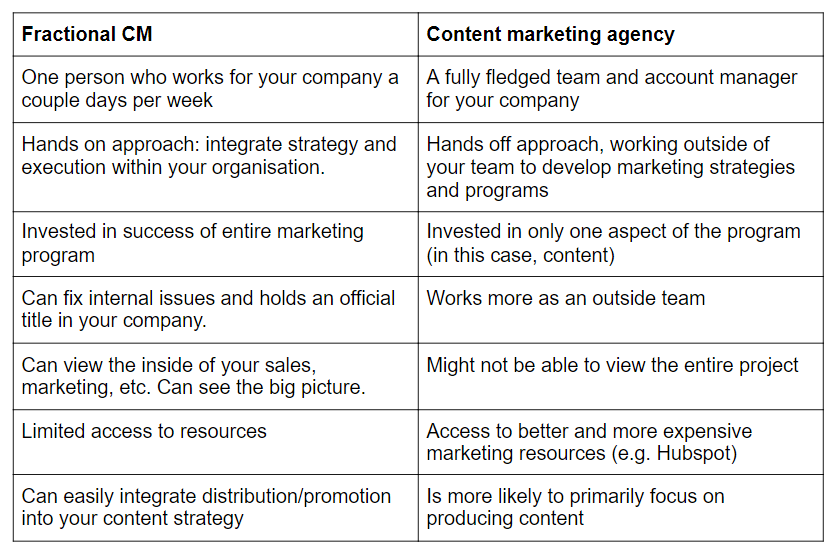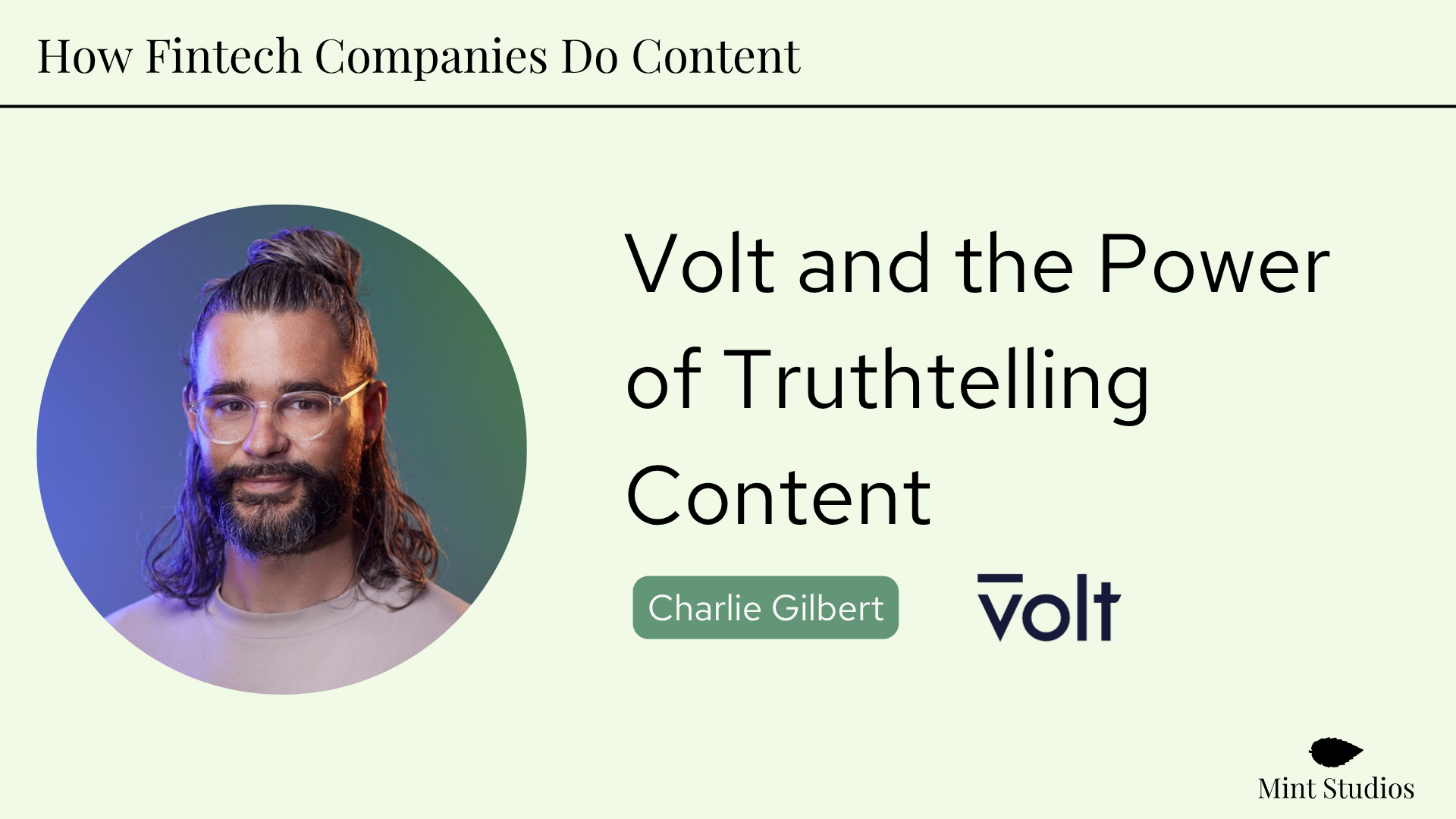In a previous article, I explained what a fractional content marketer is.
To summarise: a fractional content marketer is a part time content marketer who also holds a title in your company and manages both the strategy and execution side of things.
If you are a fintech - or any company for that matter - that is looking to get serious about content marketing, it’s likely you’re also considering hiring a content marketing agency.
So which should you go for?
I thought I would ask seasoned content marketers and agency owners and see what they say...
Hiring a fractional content marketer vs. a content marketing agency
Hiring a fractional content marketer sounds like a great idea - but why not just go for a content marketing agency?
Good question. Really, it depends on your needs and goals.
I created this table to roughly explain the differences between a fractional/part-time/freelance content marketer, and a content marketing agency. Some may disagree/add different items - feel free to send me an email if you think I should add something else.

Which one is best for your company?
Here’s what several content marketers and agency owners say:
Ryan Carruthers, in-house content marketer at Together Platform:
I can speak from my experience getting my most recent job.
At Together Software, before me, they had a freelance writer for once a week and an SEO consultant. They hired me as their in house content marketing specialist because they were realizing that a part time writer was great at pumping out content, but they didn’t know the product or our audience intimately. This showed through the content. It was all very topical and wasn’t converting our audience.
The same went for the SEO consultant. They did an amazing job bringing the site from 0-50 DR but they didn’t have the capacity to do the changes that needed to be made to convert more traffic.
Overall, having someone in house is better because they know your audience, they can champion your whole site, and will have the capacity to scope out creative content projects that build a loyal audience that wants to buy from you.
Jordy, founder of Clear Crossing Academy
I think one of the biggest value adds that an agency brings is reliability over time. You're going to pay a LOT more per hour for the same output with an agency, so you really need to understand what those value-adds are.
Reliability is a big one since the agency (we'll assume it's a decent agency) has backup resources, more layers of QA, etc.
Another agency value-add is the Account Management and/or Project management layer. If the content needs are complex and/or you as a client have little time/patience/skill in communicating with creatives, an agency can be a huge help.
A PT (part time) person can be much cheaper, but if they go MIA (Missing in Action) you can be left high and dry. A PT person is probably less invested in your success than a FT person and may deprioritize your needs more than an agency that wants to build a longer term relationship.
A PT person may also not be able to handle a certain level of complexity, and you have to communicate with them directly.
Erik Dietrich, agency founder of Hit Subscribe
At the risk of oversimplifying, I think there are common tradeoffs that apply to "agency or freelancer" in general, specific agency focus notwithstanding. For instance, freelancer pros include:
- Generally less expensive
- Generally willing to let you dictate terms/arrangement, rather than dictating it to you
- Can often be flipped to an FTE if the arrangement works well
- Not subject to agency bait-and-switches (sell you on people with lots of experience, then offer a 'blended' rate and staff your account with less experienced people)
Whereas agency pros include:
Generally more reliable/more skin in the game
- Established commodity with more resources
- Saves backfill and recruitment costs
- Shields you from individual personnel drama (or tries to, anyway!)
- More likely to have expertise to help leadership at a strategic level
Christina Pashialis, founder of Content UK
Some pros of getting a part-time content marketer:
1. 360 understanding of your company: a part-time content marketer, by nature of spending so much time in your company and being exposed to different colleagues, gets to understand your company, values and product deeply in a way that you might not get from an agency that’s working on multiple clients at once
2. Get an experienced content marketer, for cheaper: you might not be able to afford an experienced content marketer full-time or have the time/resource to train up a junior content marketer. Hiring an experienced content marketer part-time can an affordable solution to this
Emma Westley, marketing consultant and founder of immerj
Having someone in-house they will really get to know the company and culture. On the flip side, using an agency will get you multiple heads working on your project, so different viewpoints.
I’d always advise an agency when you want a new level of creativity or outside angle; but in-house if you need it to be someone who understands your company and product/service better.
Tom, director of content at Juro
You'll spend 3x the time on briefing the agency and 3x the money on the end product
If: 1 - what comes back is what you were actually looking for; and 2 - money is no object, then you can possibly scale the output, let them handle it for you, and your problem is solved.
In my experience there's about a 1 in 5 chance of (1) above being the case.
Caveat: bad content is very often the result of bad briefing.
However, I've always found it easier to explain your value prop and objectives to one person, work with and upskill one person, and manage a relationship with one person, than I have an agency.
If I need something spectacular, technically difficult, or remarkably creative, and I have a load of money, then agency would be a good bet (but it is a bet, a gamble). That's where we saw good results with agencies when we worked at a bank.
If I need content that is an extension of what we're already doing right now, but we've run out of people to produce it, I'd always try to take on one freelance/contractor before taking on an agency. Just simpler and easier.
Tom Whatley, founder and CEO at Grizzle
If you're serious about content marketing, you should probably hire someone in-house to take ownership (part time or otherwise), or at the very least make it a priority for yourself as a marketing leader.
The key point there is "problem". Most clients hire us to solve specific problems or fill gaps that themselves or freelance writers can't fill, which are usually pretty strategic in nature.
It also depends on growth/marketing maturity.
Sometimes we get hired by startups who know the value of content + SEO but have no context around what they should or shouldn't be doing. A startup with an in-house "Head of Growth" with experience managing content teams, however, is way more likely to succeed by managing freelancers or hiring individual contributors (at first, anyways).
Beth Gladstone, part time content marketer at Beth Gladstone
Agencies generally require more management and active communication to ensure they know what's happening within the company & wider strategy.
With part-time content marketers this is easier as they take more an employee-type role, joining marketing meetings or company All Hands', which helps them to stay abreast of key changes, which while not directly content related, will or should, affect the type of content they create
In my experience, at some point you will outgrow a part-time content marketer and will need someone full-time, in house or to look for a means (like an agency) which has the ability to scale your content efforts.
One person only has so many hours in the day, however if you're early-stage or just getting started with content a part-timer is a good way to go as it gives you the ability to experiment and learn, with someone who is close to your business. Who knows - when the time comes to hire a full time content marketer maybe they'll even want the job!
I know I've gone from being part-time to full-time for a company in the past as I loved their vision so much and wanted to see the strategy through that I'd laid the foundations for.
Dom Kent, part time content marketer and agency founder of UC Marketing
I think it comes down to the person or people rather than the title or label. For example, at Mio, I am the part-time content marketer. But, I am also a Unified Comms content marketing agency.
So I am living proof that both titles can be the same person or people.
That said, agencies come with the stigma of charging more due to the resource pool. Is that right? I'm not so sure. I'd rather pay the best freelancer in a niche than hire an agency who looks after multiple accounts.
On the flip side, if the part-time content marketer is genuinely part-time and not freelance, what's to say they don't want a full-time job and you're always at risk of losing them.
I don't have the answer to this question. But finding a balance is key.
As you can see, the responses vary. Ultimately, it’s up to you.
As I mentioned in my previous post, there are three main reasons I see as to why you would want to hire a fractional content marketer:
1. You want your team to learn about content marketing
Having a content marketing leader that is part time means they will set up the processes and have a strategy in place so your team can work even if they leave. They will have the templates on hand, the Airtable set up and know how to prepare briefs. They can also answer questions and train employees who want to learn about content marketing.
2. You want to do content marketing that really stands out
You know your customers do a lot of research on your topic, and you know content marketing would be a great lead generator. But you don’t want more cookie cutter, typical SEO articles. What you want are articles that have an opinion, that interview experts and collect quotes from the industry so you really stand out.
In that case, I would argue you need someone who can build relationships and organise this strategy appropriately.
3. You don’t have the budget for a content marketing agency or want more flexibility
The most obvious reason you might want to hire a fractional content marketer is if you don’t have the budget for a full time hire or an agency. Many agencies require upfront commitments and month long contracts. Although content marketers are not cheap, you can hire them on a per day basis and still get results.
FCMs are also a lot more flexible, and you don’t need to commit to a 12 month contract. Not only that, but they may be open to going full time after a certain time period.
Mint Studios is a fintech content marketing agency that helps turn your fintech blog into a customer acquisition channel. How? We use the Mint Studios framework.
Learn more about what we do:











